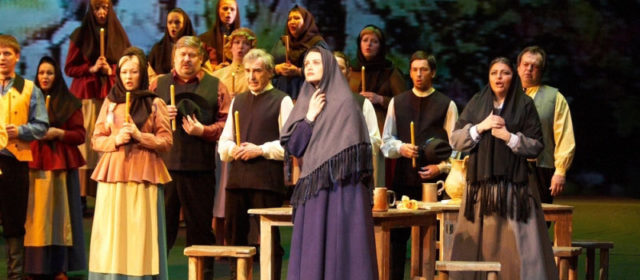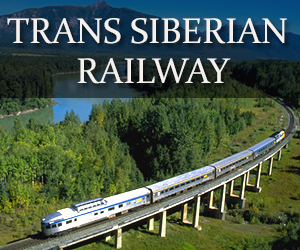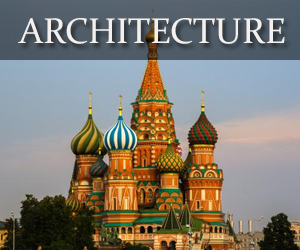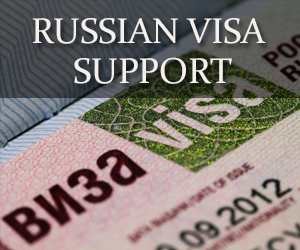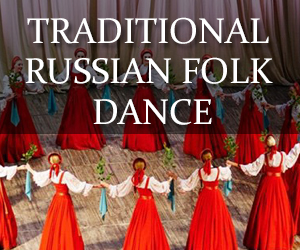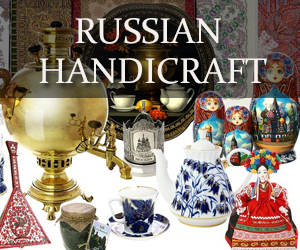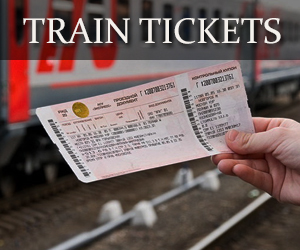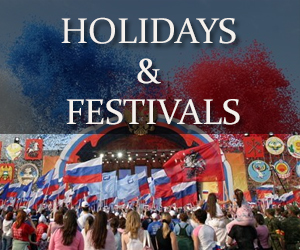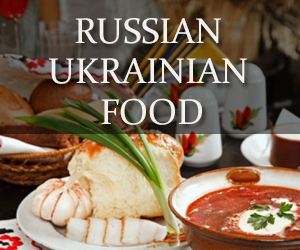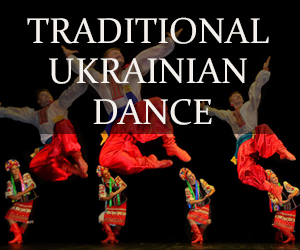Dating back to the mid 18th century, Russian opera was one of the first West European performing arts to be embraced by a Russian audience. Thanks to a long list of great Russian composers and talented writers, opera in Russia and Ukraine has since gained a high level of respect both at home and abroad. The following outline gives a summary of Russian opera from its infancy right to present day, as well as a list of “must see” opera theatre for those visiting Russia and / or Ukraine.
- Origins of Russian Opera
- 18th Century Composers
- 19th Century Opera
- 20th Century Opera
- 21st Century Opera
- Russian Opera Mementos
- Must See Opera Theatre
See also: Classical Music, Drama Theatre and Ballet
Origins of Russian Opera
The origin of Russian opera can be traced back to 1731 when Frederick Augustus I (King of Poland and Elector of Saxony) lent his Italian opera troupe to Empress Anna for the celebration of her coronation in Moscow. Giovanni Alberto Ristori presented this first opera, Calandro, with the assistance of his father Tommaso Ristori, 13 actors and nine singers. Making an obvious impression, the Empress invited another Italian opera troupe, led by composer Francesco Araja, four years later.
Francesco Araja went on to spend a total of 25 years in Russia and wrote at least 14 operas for the Russian Imperial Court. A few notable operas of the Italian composer include Bellerofonte (1750) – the first opera to include a Russian participant (singer Mark Poltoratski), and Tsefal i Prokris (1755) – the first opera written in Russian language.
Another foreigner to have a longstanding influence in Russian opera was composer Hermann Raupach. The German composer spent 18 years in Russia serving as a court composer and eventually, as an instructor at the Imperial Academy of Arts in St Petersburg. Raupach wrote the second opera in Russian language, Alceste (1758).
18th Century Russian Composers of Opera
As the 18th century progressed early Russian composers, trained at home and abroad, started to appear. A few of the 18th century Russian (and Ukrainian) composers of opera are as follows:
- Maksym Berezovsky (1745-1777)
- sent by Catherine the Great in 1769 to train at the Bologna Philharmonic Academy in Italy, Berezovsky composed music for opera seria Demofoonte
- Dmytro Bortniansky (1751-1825)
- A pupil of Baldassare Galuppi, Bortiansky followed his teacher to Italy where he gained considerable success composing operas (3 in Italy, and 4 more French language operas upon returning to St Petersburg).
- Vasily Pashkevich (1742-1797)
- A Russian composer (of Polish decent), Pashkevich set music a total of 9 different operas, including comic opera The Miser, and opera Fevey (which interestingly, was an opera libretto written by Catherine the Great).
- Yevstigney Fomin (1761-1800)
- Italian trained composer who wrote music for roughly 30 operas in his lifetime, including the highly successful opera-melodrama Orfey i Evridika.
19th Century Russian Opera
The 19th century was perhaps the pinnacle of Russian opera. In addition to many talented new Russian composers, private theatre started to emerge in Russia, giving opera a much wider audience. This new audience longed for a genre that would combine music, literature, and scenic movement. Opera not only fulfilled this role, but it did so while presenting important ideological, historical and psychological issues of the time.
The 19th century started with several great operatic works produced by foreign composers. The first was the translated work of German composer Ferdinand Kauer – Lesta, dneprovskaya rusalka (1803). The second – Ivan Susanin (1815) – was a patriotic opera based on Russian history, written by Italian composer and longtime Russian resident Catterino Cavos. Thereafter, most of the great operas to come out of Russia were written by native composers. A few of the important 19th century Romantic era Russian composers of opera are as follows:
- Alexey Verstovsky (1799-1862)
- composed more than 30 opera-vaudevilles and 6 grand-operas including Askold’s Grave (1835)
- Mikhail Glinka (1804-1857)
- Considered the founder of Russian classical music and national opera, his two great operatic works – A Life for the Tsar (1836) and Ruslan and Lyudmila (1842) – helped elevate Russian opera to new heights.
- Alexander Dargomyzhsky (1813-1869)
- composed Rusalka (1856) and The Stone Guest (completed by Rimsky-Korsakov – premiered in 1872)
- Semen Hulak-Artemovsky (1813-1873)
- composed 3 operas including A Zaporozhian Beyond the Danube (1863)
- Alexander Serov (1820-1871)
- composed Judith (1863), Rogneda (1865), and The Power of the Fiend (1871)
- Anton Rubinstein (1829-1894)
- Founder of the St Petersburg Conservatory, Anton Rubinstein composed a total of 19 operas, including The Demon (1875).
- César Cui (1835-1918)
- Member of “The Five”, the composer of Russian, French and Lithuanian decent composed a total of 14 operas including William Ratcliff (1868)
- Eduard Nápravník (1839-1916)
- A Czech conductor who came to reside in St Petersburg, Nápravník conducted at the premiers of many great Russian operas. He also went on to compose four of his own operas, including Dubrovsky (1895) – to a libretto by Modest Tchaikovsky (Peter’s younger brother).
- Sergei Taneyev (1856-1915)
- composed Oresteia (1895)
- Anton Arensky (1861-1906)
- wrote 3 operas including A Dream on the Volga (1880)
- Modest Mussorgsky (1839-1881)
- Composed what is perhaps the greatest masterpiece of Russian opera – Boris Godunov (1869). Mussorgsky also composed a Revised Version (1872).
- Peter Tchaikovsky (1840-1893)
- Tchaikovsky completed a total of 10 operas including his most famous works Eugene Onegin (1879) and The Queen of Spades (1890).
- Alexander Borodin (1833-1887)
- member of “The Five”, Borodin composed Prince Igor (completed by Rimsky-Korsakov and Alexander Glazunov – premiered in 1890)
- Nikolai Rimsky-Korsakov (1844-1908)
- A member of “The Five”, Rimsky-Korsakov composed a total of 15 operas right around the turn of the century. A few of his late 19th century operas include May Night (1879), The Snow Maiden (1st Version 1882, 2nd Version 1895), Sadko (1898), The Tsar’s Bride (1899).
- Although Rimsky-Korsakov’s operas were played at the end of the 19th century, his new approach to the genre wasn’t fully appreciated until early in the 20th century.
20th Century Russian Opera
The early 20thth century, while a period of great social change, was a period of growth Russian opera. Even with the loss of numerous great composers who fled from the disorder of the Russian Revolution and the uncertainty of a new Soviet regime, opera within Russia continued to evolve.
It was only in the early 1930s when the creativity of the “revolutionary” period was stifled by Joseph Stalin. The Soviet leader favored a direction towards Socialist Realism (or Socialist Classicism), a style more easily scrutinized and kept within the conventions of broader Socialist policy. Many composers such as Prokofiev and Shostakovich struggled under this new paradigm. They were often criticized, and their works condemned, if they tried to use new and innovative ideas that deviated from the accepted Socialist models.
And while restraints were somewhat loosened post Stalin, Russian opera was still quite restricted during the entire communist era. Opera, after all, is a voice to important ideological and psychological issues of the day, and freedom of such expression was frowned upon under the Soviet regime.
Below is a small list of 20th century composers of Russian opera:
- Nikolai Rimsky-Korsakov (1844-1908)
- A turn of the century composer, we’ve added Rimsky-Korsakov to both the 19th and 20th century lists
- A few of his early 20th century operas include The Tale of Tsar Saltan (1900), Kashchey the Immortal (1902), The Legend of the Invisible City of Kitezh and the Maiden Fevroniya (1904), The Golden Cockerel (1907).
- Vladimir Rebikov (1866-1920)
- composed over 10 operas including Yolka (1903)
- Sergei Rachmaninov (1873-1943)
- composed three operas including Aleko (1893), The Miserly Knight (1904), and Franchesca da Rimini (1906)
- Igor Stravinsky (1882-1971)
- One of the most influential composers of the 20th century, a few of Stravinsky’s operatic works include The Nightingale (1914), opera buffa Marva (1922), Oedipus rex (1927), The Rake’s Progress (1951).
- Sergei Prokofiev (1891-1953)
- Another of the great composers of the 20th century, a few of Prokofiev’s operas include The Gambler (1917), The Love for Three Oranges (1919), The Fiery Angel (1927), Semyon Kotko (1939), Betrothal in a Monastery (1941), War and Peace (1943), The Story of a Real Man (1948).
- Dmitri Shostakovich (1906-1975)
- A celebrated Russian composer who struggled under the confines of Socialist ideology, several of his operas were deemed “formalist” (too experimental). These include a satirical opera The Nose (1929) and his second and even more harshly criticized opera Lady Macbeth of the Mtsensk District (1934).
- Vano Muradeli (1908-1970)
- A native Georgian composer who did his post-graduate studies at Moscow Conservatory, his opera The Great Friendship (1947) – which showcased traditional tunes and dances of the Caucasian peoples – was censured by the Communist Party soon after its premiere.
- Yuri Shaporin (1887-1966)
- composed opera The Decembrists (1953)
- Veniamin Fleishman (1913-1941)
- A young Soviet composer studying under Shostakovich at the Leningrad Conservatory, Fleishman started his opera Rothschild’s Violin before his death as a volunteer at the outbreak of war in 1941. Shostakovich rescued the manuscript from besieged Leningrad and completed the work in 1944. The opera’s premiere, nonetheless, wasn’t staged until 1968.
- Mieczysław Weinberg (1919-1996)
- A Soviet composer of Polish-Jewish origin, Weinberg completed seven operas including The Portrait (1980).
- Edison Denisov (1929-1996)
- a Russian composer of so called “Underground” (nonconformist Soviet music), Denisov wrote 3 operas including L’écume des jours (1981).
- Nikolai Korndorf (1947-2001)
- chamber opera MR (Marina and Rainer) (1989)
- Elena Firsova (1950-present)
- 2 chamber operas – A Feast in Time of Plague (1973) and The Nightingale and the Rose (1991).
- Alexander Knaifel (1943-present)
- composed 2 operas – The Ghost of Canterville (1966) and Alice in Wonderland (2001)
21st Century Russian Opera
Russian opera of the 21st century is at the beginning of a new era of evolution. Just like the start of the previous two centuries, which saw great development in the art, opera within Russia once again has the freedom of expression that was once stifled under the Soviet regime.
A few 21st century composers and their operas are listed below.
- Iraida Yusupova (1962-present)
- A Moscow resident with Russian and Tatar ethnicity, Yusupova has composed several opera including Einstein and Margarita (2004).
- Leonid Desyatnikov (1955-present)
- A graduate of Leningrad Conservatory, Desyatnikov has composed 4 operas including comic opera –Rosenthal’s Children (2005).
Must See Opera Theatre
Moscow Opera Theatre
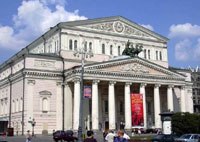 Bolshoi Theatre
Bolshoi Theatre
One of the oldest and most famous theatres in the world, the Bolshoi theatre company dates back to 1776, while the building itself dates back to its 1825 Grand opening which staged Fernando Sor’s ballet Cendrillion. Since then the Bolshoi theatre has hosted many historical opera and ballet premiers and gone through many restorations. The most recent (and ongoing) restoration is expected to be complete for the 2011-2012 theatre season. In the meantime audiences can enjoy classical productions and modern opera and ballet performances on the new stage directly behind the historical building.
address: 1, Teatralnaya Ploshad, Moscow
metro: Teatralnaya, Okhotny Ryad, Ploshad Revolutsii
box office: daily 12 noon – 7pm (3pm – 4pm break)
website: Bolshoi.ru
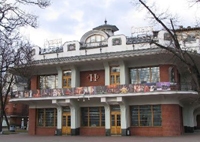 Kolobov New Opera Theatre
Kolobov New Opera Theatre
Founded in 1991 by renowned Russian conductor Evgeny Kolobov and Moscow Mayor Yuri Luzhkov, the Kolobov New Opera Theatre has quickly gained the deserved reputation as a world class opera theatre. They have won a number of prestigious awards for their performance and mastery of original productions, and in 1999, the theatre was granted a member status in the International Association “Opera Europa”. To add to the quality of each production, in 1997 the opera theatre also moved into a new 700 seat state-of-the-art facility located at the Hermitage Garden in Moscow’s center.
address: 3, ulitsa Karetny Ryad, Hermitage Garden, Moscow
metro: Tverskaya, Pushkinskaya, Chekhovskaya
box office: daily 12 noon – 7pm (3pm – 3:30pm break)
website: NovayaOpera.ru
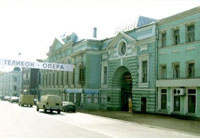 Helikon Opera
Helikon Opera
Like the New Opera (above), the Helikon Opera is a relatively young company. Founded in 1990 by the People’s Artist of Russia Dmitry Bertman, it is one of the most innovative opera companies in the world. It’s deliberate departure from mainstream theatrical techniques (focusing on high-quality, realistic acting as much as the music), have earned the Helikon some criticism and much critical acclaim – including eight “Golden Masks” in different nominations. Currently the Helikon Opera, which has a small 250 seat capacity, is undergoing reconstruction.
address: 19, ulitsa Bolshaya Nikitskaya, Moscow
metro: Arbatskaya
box office: daily 11am – 7pm (3pm – 4pm break)
website: Helikon.ru
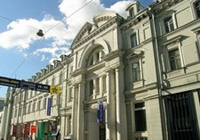 Moscow Chamber Musical Theatre
Moscow Chamber Musical Theatre
Also known as the Moscow State Academic Chamber Musical Theatre, the popular Moscow opera theatre is home to a company known as the Pokrovsky Opera. Founded in 1971, the theatre bears the name of founder Boris Pokrovsky, a former operatic stage director of the Bolshoi Theatre (from 1943 to 1982). Over the decades the exacting and uncompromising director has helped develop a diverse and innovative repertoire of both classical and contemporary works. Combine this with a state-of-the-art theatre that seats up to 240 people and you get an intriguing, very entertaining night at the opera.
address: 17, ulitsa Nikolskaya, Moscow
metro: Okhotny Ryad, Teatralnaya, Ploshad Revolutsii
box office: daily 11am – 7pm (3pm – 4pm break)
website: Opera-Pokrovsky.ru
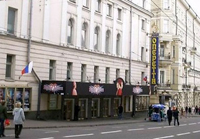 Moscow Operetta Theatre
Moscow Operetta Theatre
The State Academic Moscow Operetta Theatre, which has been staging performances since 1927 (and in its current 1600 seat location since the sixties), originally concentrated on light opera classics as well as Soviet operetta. Today it has broadened its repertoire to include highly popular musicals – both Russian and those of Western genres translated into Russian.
address: 6, ulitsa Bolshaya Dmitrovka, Moscow
metro: Okhotny Ryad, Teatralnaya
box office: daily 12 noon – 7pm (3pm – 4pm break)
website: MosOperetta.ru
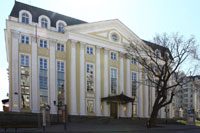 Galina Vishnevskaya Opera Center
Galina Vishnevskaya Opera Center
Opened in 2002 by legendary soprano Galina Vishnevskaya, the center gives recent graduates of musical conservatories the opportunity to work with some of the biggest names in Russian opera. Housed in a modern facility, the 336 seat theatre stages a diverse repertoire that not only includes full operas, but symphony and chamber orchestra concerts as well.
address: 25, ulitsa Ostozhenka, dom 1, Moscow
metro: Kropotkinskaya, Park Kultury
box office: daily 12 noon – 7pm (3pm – 4pm break)
website: Opera-Centre.ru
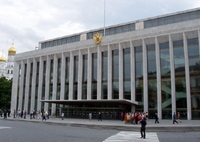 State Kremlin Palace (GKD)
State Kremlin Palace (GKD)
Located within the historic Moscow Kremlin, the concert hall plays host to numerous official functions, concerts, opera and ballet. Seating up to 6000 spectators, the repertoire includes the Kremlin Ballet Theatre, ballet from the Bolshoi Theatre, and that of visiting companies.
address: Moscow Kremlin, Moscow
metro: Aleksandrovsky Sad, Biblioteka Imeni Lenina
box office: daily 12 noon – 7pm (3pm – 4pm break)
website: Kremlin-GKD.ru, GKD-Kremlin.ru
Saint Petersburg Opera Theatre
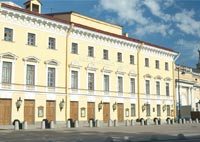 Mikhailovsky Theatre
Mikhailovsky Theatre
One of the oldest opera and ballet theatres in Russia, the Mikhailovsky Theatre was founded in 1833 at its historical location on Arts Square (Iskusstv Ploschad). While it currently goes by its original name, you may also notice locals using its other name (used from 1989 to 2007) – Mussorgsky Opera and Ballet Theatre. Regardless what you want to call it, visitors have the opportunity to view major opera and ballet works of the 19th and 20th centuries, performed and directed by some of the most talented and respected artists from Russia and abroad.
address: 1, Ploschad Iskusstv, St Petersburg
metro: Nevsky Prospekt, Gostiny Dvor
box office: daily 11am – 7pm (3pm – 4pm break)
website:Mikhailovsky.ru
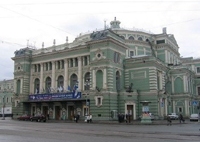 Mariinsky Theatre
Mariinsky Theatre
The Mariinsky Opera and Ballet Theatre, often referred to as the Kirov Opera and Ballet (as it was known during Soviet times), is home to one of the most famous ballet companies in all the world. Opened in 1860, it became the premiere music theatre of late 19th century Russia. The “Mariinka” as it is affectionately called today, is a architectural masterpiece unto itself, so whether you take in a ballet or opera you are in for a marvelous treat.
address: 1, Theatralnaya Ploshchad, St Petersburg
metro: Sadovaya, Sennaya Ploshchad
box office: daily 11am – 6:30pm
website:Mariinsky.ru
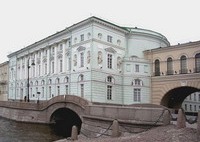 Hermitage Theatre
Hermitage Theatre
Built between 1783 and 1787, the Hermitage Theatre is one of the oldest theatres in all of Russia. One of five Hermitage buildings along the Palace Embankment of the Neva River, it served as a living theatre but for a brief time – until the death of Catherine the Great in 1796. It wasn’t until its 1989 restoration that it was reopened for theatrical performances. Today it is considered one of the best chamber music theatres in the world playing host to opera, ballet and chamber music concerts.
address: 34, Dvortsovaya Naberezhnaya, St Petersburg
metro: Nevsky Prospekt, Gostiny Dvor
box office: daily 11am – 6:30pm
website: Balet-spb.ru, HermitageMuseum.org
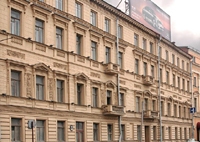 Chamber Music Theatre – St. Petersburg Opera
Chamber Music Theatre – St. Petersburg Opera
Founded in 1987 by one of Russia’s leading musical theatre directors, Yuri Alexandrov, the Chamber Music Theatre has evolved into a professional State theatre respected both in Russia and abroad. Even more recently – 2003 – the music theatre acquired its own home, the renovated 18th century mansion of Baron von Derviz on Galernaya Street in the heart of St Petersburg. It now performs a diverse repertoire of original works from every operatic genre – classical to modern – many of which are exclusive to its own stage.
address: 33, ulitsa Galernaya (Baron von Derviz Mansion)
metro: Sadovaya, Sennaya Ploshchad
box office: daily 12 noon – 7pm (3pm – 4pm break)
website: SPbOpera.ru
Kiev Opera Theatre
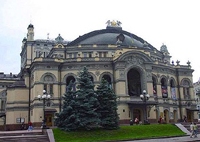 National Opera House of Ukraine
National Opera House of Ukraine
Officially named the National Academic Theatre of Opera and Ballet named after T.G. Shevchenko, Kiev’s oldest musical theatre dates back to 1867. Following a 1896 fire that destroyed the original building, the theatre moved into its current, neo-Renaissance style facility, in 1901. Throughout the turbulent 20th century the opera house adopted various names and followed different ideological directions (from classical Russian and European performances, to a period of Ukrainization and liberalization, to Socialist Classicism in which more contemporary works were largely condemned). Despite the change, the one thing that remained constant was the high artistic level of the troupe. Today the theatre stages a wide range of opera and ballet performances, both classical and contemporary, and has earned awards and recognition both at home and around the world.
address: 50, Vladimirskaya street, Kiev
metro: Zoloti Vorota
website: Opera.com.ua
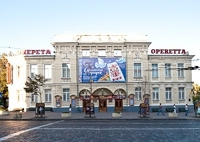
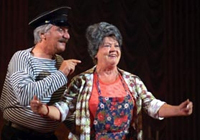
Originating from the Kiev Theatre of the Music Comedy (1907-1934), the Kiev State Operetta Theatre is still located in the historic Troitsky People’s House used by the original theatre. From its official founding in 1934 to present, it has become the cradle of music-dramatic art in Ukraine. Today you can find a range of musical theatre, from classic operettas and musicals, to music comedy and children’s shows from national and foreign authors.address: 53/3, Bolshaya Vasilkovskaya street, Kiev
metro: Respublikansky Stadion
box office:
website: Kiev-Operetta.kiev.ua

